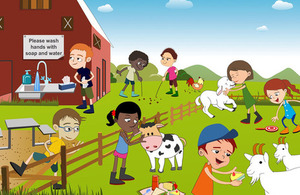Where there’s muck there’s bugs: e-Bug lesson plans help children to stay safe down on the farm
Public Health England study finds that use of interactive lesson plans significantly improved pupils’ knowledge of bugs and hand hygiene

Farm scene
A study by Public Health England (PHE) has found that use of interactive lesson plans significantly improved pupils’ knowledge of bugs and why hand hygiene is important in a farm setting with 80% of children correctly answering questions after the intervention. This research is published in the science journal PLOS ONE today.
The interactive lesson plan was devised by e-Bug a European-wide educational resource for junior and senior students, which is led by PHE in its Primary Care Unit in the South West and is available free for teachers at the e-Bug website.
School visits to farms are a positive educational experience but do pose a level of risk of infection from a number of bugs including ‘E. coli’, ‘Salmonella’ or ‘Campylobacter’ which are found in animal faeces and on surfaces around the farm.
A total of 210 children aged between 9 and 11 took part. These came from rural locations and small towns across England. The lesson lasted between 1 to 2 hours and covered 3 topics: introduction to microbes, hand hygiene and farm hygiene. Teachers used a ‘true/false/don’t know’ questionnaire before and after the lesson plan to assess how the children’s knowledge developed.
Improvements could be seen in various areas. The full list can be found in the study paper which is published online:
| Topics | Activity questions | After the lesson correct answers 2012 rate per 100,000 | % improvement with lesson |
|---|---|---|---|
| Introduction to microbes: | If you cannot see a microbe it is not there | 197 (94%) | 20% |
| All bacteria are harmful | 187 (90%) | 12% | |
| At the farm microbes can be found: | On cows | 201 (97%) | 17% |
| On gates | 180 (91%) | 35% | |
| In the grass | 172 ((86%) | 31% | |
| On your wellie boots | 176 (88%) | 26% | |
| It is OK to eat your sweets while walking around a farm | 159 (77%) | 13% | |
| Hand hygiene: | Washing hands with alcohol gel/wipes will remove all bad microbes on the farm | 125 (61%) | 23% |
Meredith Hawking, a researcher at PHE’s Primary Care Unit in the South West and lead author of the study said:
The positive results from our study show how these interactive lessons can be very beneficial in teaching behaviours to reduce risks of acquiring infections. This is particularly important within the farm setting as some childhood behaviours such as nail biting, sucking thumbs and eating on-the-go give more opportunity to ingest harmful bacteria.
We also saw that children had a high level of knowledge that they should wash their hands after contact with an animal, but not all that know this do it consistently. By building on a child’s knowledge and awareness of what could be harmful we can hopefully encourage them to adopt positive habits and behaviours. We would therefore encourage schools to use the e-Bug farm activity before farm visits.
Ends
Notes to editors
- Access the farm activity.
- Previous research has shown that this type of interactive teaching on hygiene and microbiology enables students to retain the knowledge beyond the classroom.
- Public Health England’s mission is to protect and improve the nation’s health and to address inequalities through working with national and local government, the NHS, industry and the voluntary and community sector. PHE is an operationally autonomous executive agency of the Department of Health. www.gov.uk/phe Follow us on Twitter @PHE_uk
UKHSA press office: National Infection Service
UKHSA press office, infectious diseases
61 Colindale Avenue
London
NW9 5EQ
Updates to this page
-
First published.